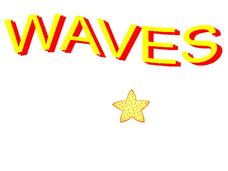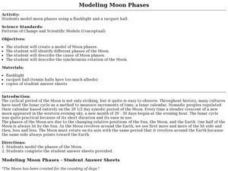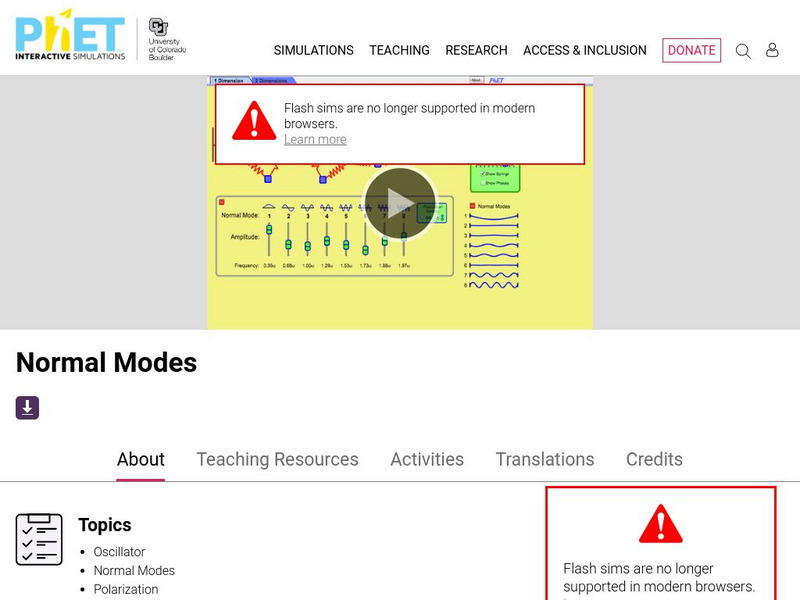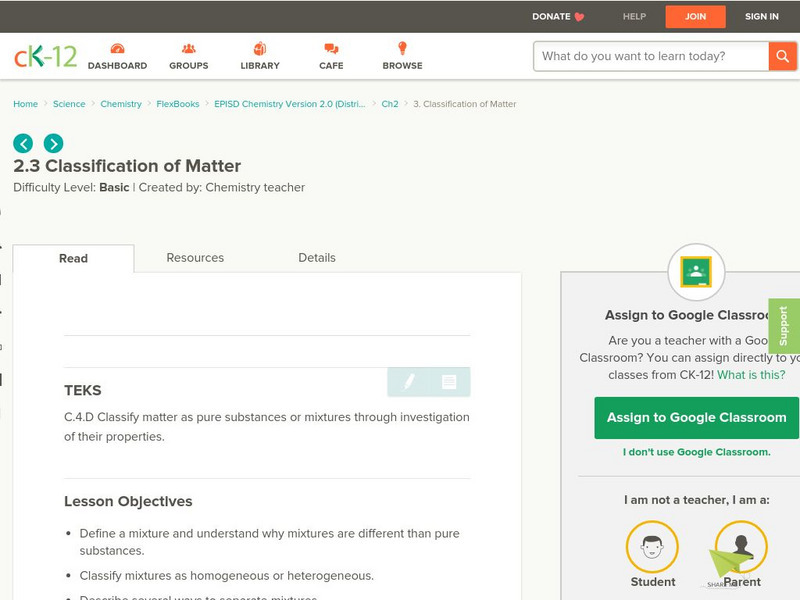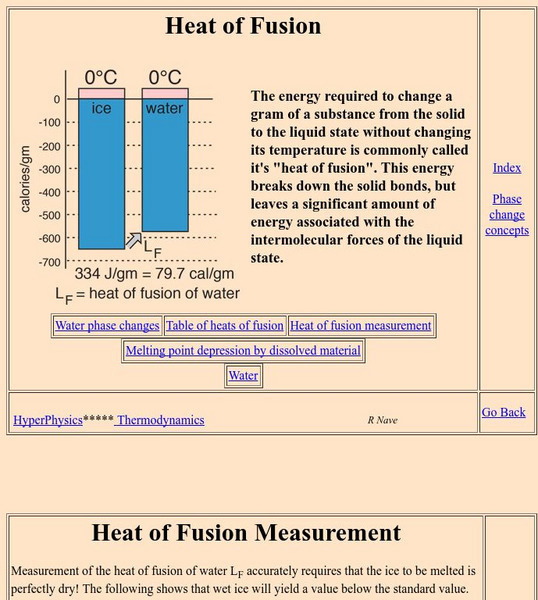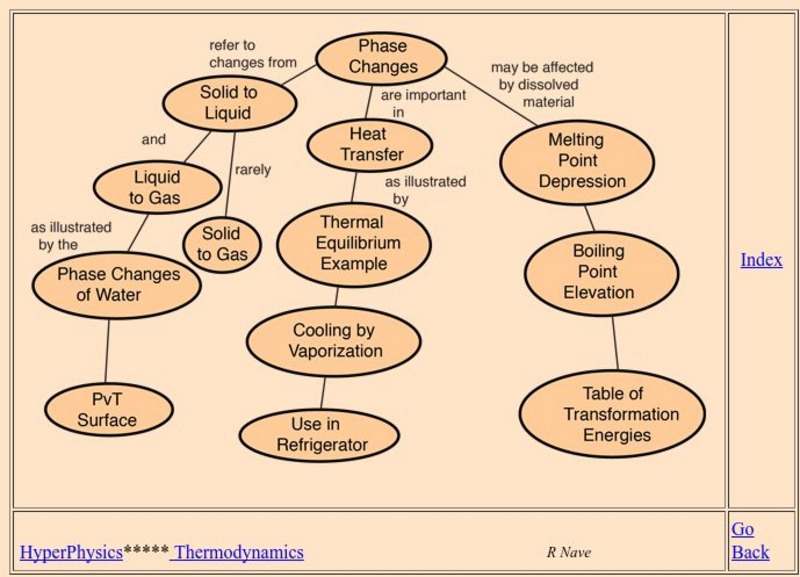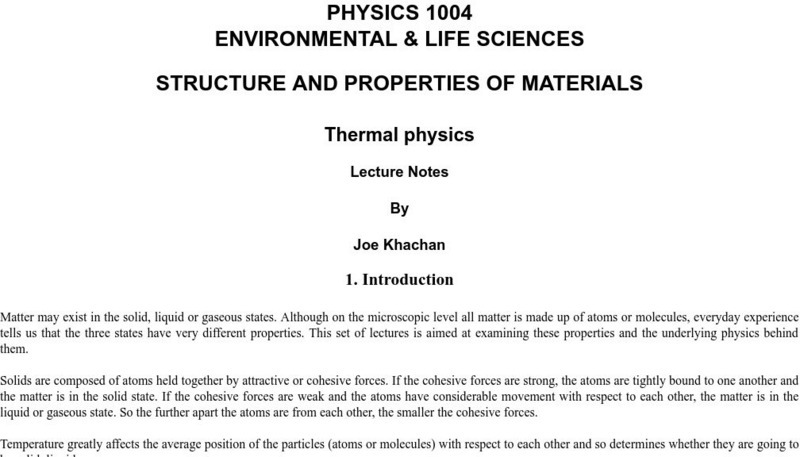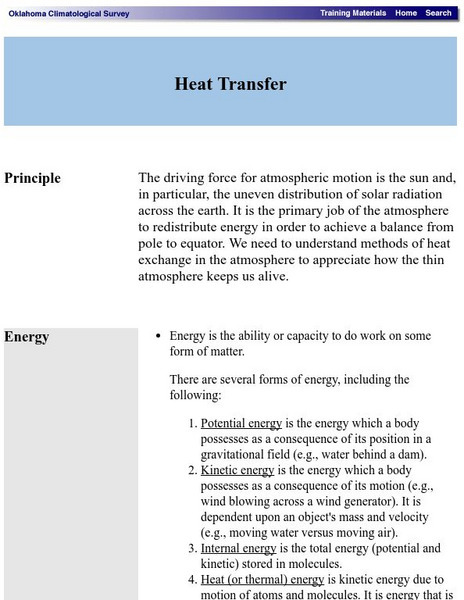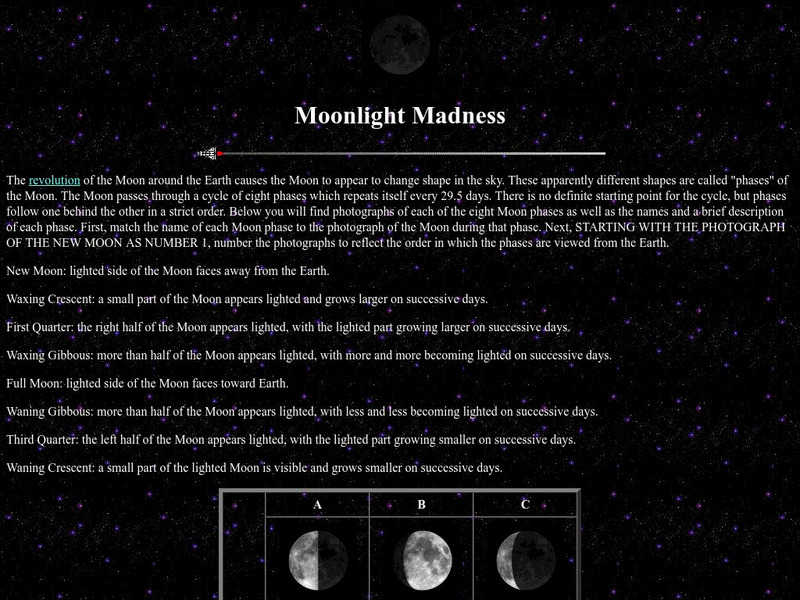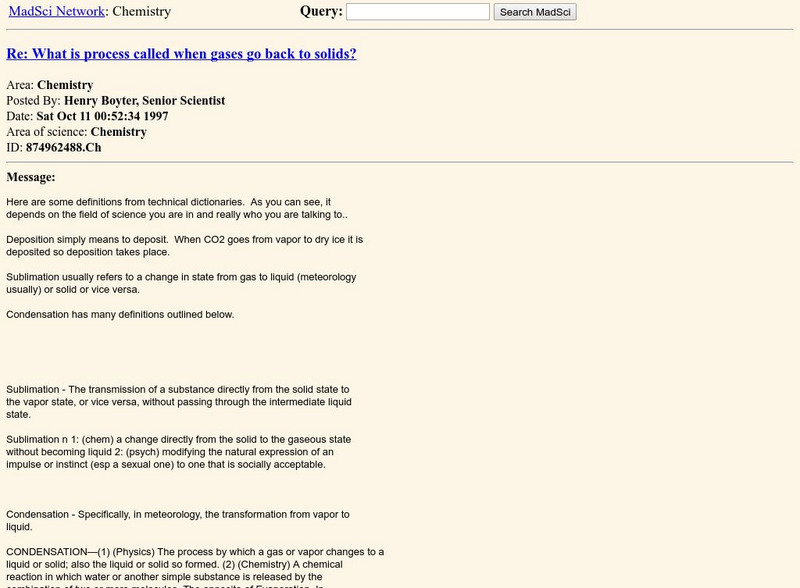Curated OER
Waves
An incredibly colorful PowerPoint presents all the facts and definitions about waves that you could need for beginning physical scientists. There are several useful links to online animations of wave action. This may have been produced...
Curated OER
Heating and Cooling Curves
High schoolers experiment with a pure substance and a phase change. In this heating and cooling curves lesson plan, students study the effects of heating and cooling a pure substance to observe a phase change. They determine both the...
Curated OER
Modeling Moon Phases
Learners identify the phases of the Moon and the synchronous rotation. In this hands on lesson students will create a model of the Moon.
American Chemical Society
Middle School Chemistry: Chapter 1: Solids, Liquids, and Gases
Five exemplary chemistry lessons about the three states of matter complete with handouts and animations.
University of Colorado
University of Colorado: Ph Et Interactive Simulations: Normal Modes
An interactive simulation that teaches about oscillators, normal modes, and polarization by varying the number of masses and initial conditions to determine their effect on 1D or 2D systems of coupled mass-spring oscillators. This...
Cornell University
Cornell University: Astronomy: The Phases of the Moon
This site from Cornell University provides great information on the different phases of the moon. As the Moon moves in its orbit around the Sun, our view of the side illuminated by the Sun changes. Furthermore, the rising and setting...
PBS
Pbs: El Nino
You can link to the anatomy of El Nino, chasing El Nino, and El Nino's reach. There is a resource page and a search page.
CK-12 Foundation
Ck 12: Classification of Matter
[Free Registration/Login may be required to access all resource tools.] In this online tutorial students will define a mixture and understand why mixtures are different than pure substances. They will classify mixtures as homogeneous or...
Georgia State University
Georgia State University: Hyper Physics: Heat of Vaporization
A discussion of the vaporization process and the energy changes which accompany the process. Includes an informative graphic and a discussion of how to determine the heat of vaporization.
Georgia State University
Georgia State University: Hyper Physics: Phase Change Concepts
An indexing page for the HyperPhysics site. This page includes links to a variety of pages at the site which contain information related to phase changes. Each individual page consists of informative graphics and clear explanations.
Georgia State University
Georgia State University: Hyper Physics: Ac Circuits
A very comprehensive site organized well with many topics dealing with AC circuits.
University Corporation for Atmospheric Research
Ucar: Just a Phase: Water as a Solid, Liquid, and Gas
This site helps students construct a model of the arrangement of water molecules when present as solid, liquid or gas. Includes background information, lesson plans, links to standards and assessment ideas.
CPALMS
Florida State University Cpalms: Florida Students: Hot on the Trail
Learn what affect changing temperature has in regards to chemical reactions.
Georgia State University
Georgia State University: Hyper Physics: Saturated Vapor Pressure
The meaning of vapor pressure is introduced. The distinction between evaporation and boiling is discussed and explained. The reason that liquids undergo vaporization is explained.
University of Sydney (Australia)
University of Sydney: Structure and Properties of Materials/thermal Physics
An exhaustive set of "lecture notes" on various topics in thermal physics (including thermal expansion). Explanations are well done and more interesting than most. Includes both a mathematical and conceptual treatment of topics. Humor,...
Oklahoma Mesonet
Oklahoma Climatological Survey: Heat Transfer
A discussion from the Oklahoma Climatological Survey of the thermal factors effecting the movement of air masses in the atmosphere. Numerous topics such as methods of heat transfer, latent heat, phase changes (including sublimation and...
University of Florida
Chem. 2041 Lecture Notes: The Forces Between Molecules
A discussion of the variety of forces which hold molecules together. The relative strengths of these forces for the various states of matter is discussed. The effect of such forces on the boiling points and other phase change...
NASA
Nasa Star Child: Moonlight Madness
The revolution of the Moon around the Earth causes the Moon to appear to change shape in the sky. These apparently different shapes are called "phases" of the Moon. The Moon passes through a cycle of eight phases which repeats itself...
Purple Math
Purplemath: Graphing Trigonometric Functions
This resource explains how to relate constants in trigonometric function to amplitudes, vertical shifts, periods, and horizontal or phase shifts with the help of many solved examples for various trigonometric functions.
American Chemical Society
Middle School Chemistry: Moving Molecules in a Solid
Explore the movement of the molecules in a solid.
MadSci Network
The Mad Scientist Network: Chemistry
The question "What is process called when gases go back to solids?" is discussed in detail. A comparison of the processes of sublimation, deposition and condensation is made.
USA Today
Usa Today: Latent Heat Supplies Weather Energy
This article provides information on what latent heat is. A good graphic is provided and links to key terms.
Simon Fraser University
Chem1 Virtual Textbook: What Is a Wave?
Acting as part of an overview on quantum theory, this section of the site answers the question, what is a wave? In addition to a definition, several examples and formulas are provided.
Curated OER
Cornell University: The Phases of the Moon
This site from Cornell University provides great information on the different phases of the moon. As the Moon moves in its orbit around the Sun, our view of the side illuminated by the Sun changes. Furthermore, the rising and setting...


